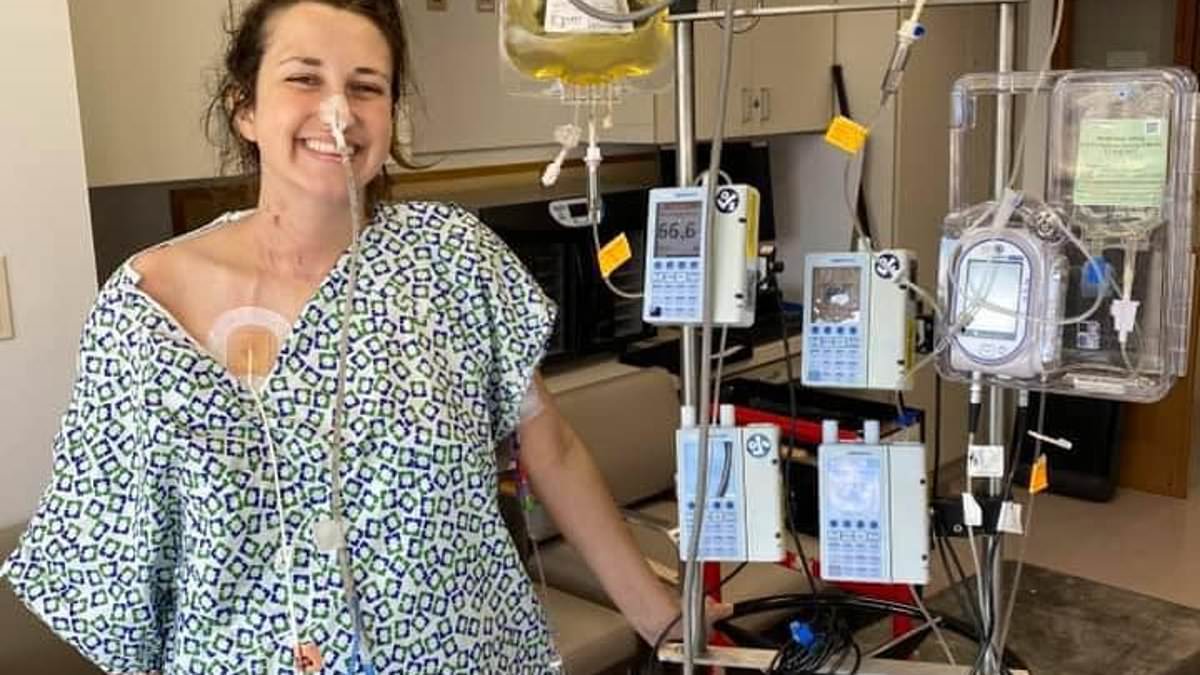A Louisiana woman has detailed how doctors told her she had less than a day to live after suffering a stomachache.
Danielle Perea, then 24, was met with the prognosis more than five years ago, and this week described how she is still alive in an interview with CBS News.
She recalled how she had suffered a blood clot in one of the vessels that carries blood from the small intestines, leaving her vomiting blood and in an emergency room as her symptoms intensified.
‘They just saw that everything was completely black, necrotic, dead,’ Perea told the station. ‘They (told my boyfriend), “There’s no way she’s going to survive this, you need to call her parents.”‘
Recalling how they were both told that she ‘probably has 24 hours to live,’ she went on to reveal how she beat the odds – spending a year and half living on IV -administered nutrition before receiving a successful transplant.
‘They were just like, “You need to get to the clinic right away.” It wasn’t an option,’ Perea recalled of how in June 2020, she got the call she had been waiting for.
The ensuing surgery took 10 hours, during which doctors worked relentlessly to address her mesenteric ischemia.
Surgeons years before had unsuccessfully attempted to save her small intestines, but were too many dead cells – also known as necrotic tissue – in other words,
‘They just saw that everything was completely black, necrotic, dead,’ Perea told the publication a little more than 200 days after tying the knot with her husband, Luis.
‘They (told Luis), “There’s no way she’s going to survive this, you need to call her parents. Get anyone here who needs to be here, because she probably has 24 hours to live,”‘ she recalled.
Doctors would then transfer her to hospice care, ticking by the days until her seemingly inevitable demise.
But there, she surpassed physicians’ expectations, maintaining ‘strong vitals’ for more than a week.
At this point, she, Luis, and her mother looked for some sort of savior, and found one in the Cleveland Clinic’s intestinal transplant program.
The head of the program, Dr. Kareem Abu-Elmagd, afterward agreed to take on the task of replacing Perea’s small intestine, giving way to the next stage of the then-grad student’s grueling road to recovery – waiting for a suitable match.
At that point, she was relocated to he hospital in Ohio, with the small bowel almost entirely resected.
Her condition, however, soon stabilized, and following several subsequent procedures, she was ready to be added to the program’s transplant list in the spring of 2019.
She spent the next year living off of nutrients pumped intravenously, due to the fact that without intestines, she couldn’t eat normally.
The duration of this stage saw her forced to undergo yet another surgery – this one repairing the damage done to her trachea from a breathing tube before she could receive the transplant.
This would add to the amount of time she had to wait, with the pandemic further complicating the process by forcing her to pass on an organ that would have been deemed a match in April 2020, she said.
Two months later, she received a call that another organ had become availiable, after which she underwent the 10-hour surgery.
Despite such transplants being notoriously difficult and rare, the operation was a success, she told CBS – before revealing how afterwards she was still confined to a hospital room intermittently for several months, after suffering frequent fevers.
Then, in January of 2021, she underwent yet another procedure – this one to repair her abdomen wall and reverse an incision made during the surgery.
Afterwards, she was given a full bill of health, before living out her life with her beloved for the next four years.
In November of last year, they would wed in Lafayette, Perea’s hometown.
During that span, she was also able to finish her degree as a clinical lab science student at the University of West Florida, before taking a job as a medical technologist at Pensacola’s Ascension Sacred Heart.
She added to CBS how despite now living relatively normally, she has to take ‘about 40 pills a day’ to keep her condition in check.
She also aired the possibility she still might need a kidney transplant in the future, due to the amount of anti-rejection medications she has been forced to take that inherently damage the organ.
Still, she said that everything has been “super normal” so far, and is looking forward to living a long, healthy life.
‘I don’t have any restrictions. My incisions healed well,’ Perea said, bringing up how she had married in November. ‘We bought a house,’ she further revealed. ‘It’s just all going well.”
As for the parting words from the doctors at the Cleveland Clinic, she said, ‘They’re like, “Just keep living your life. There’s nothing stopping you.”‘
They were responsible for 18 of the US’ 95 intestinal transplants last year, with the operation having a low success rate due to being “difficult” organ to monitor, and having the highest rejection rate of any kind of organ transplant.
Pera, however, beat the odds, offering hope to any faced with a similar undertaking.
